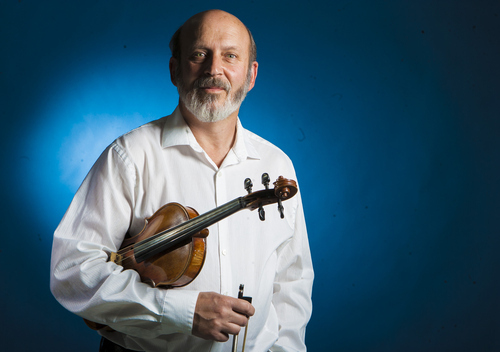This is an archived article that was published on sltrib.com in 2012, and information in the article may be outdated. It is provided only for personal research purposes and may not be reprinted.
Gerald Elias, former associate concertmaster of the Utah Symphony, received two pieces of advice about getting his book published. One camp told him he'd never find a publisher without an agent. The other told him he'd never find an agent without first securing a publisher.
As a violinist, Elias did what came naturally. He played it by ear. Today, in some circles, his character of the blind, cantankerous violinist and sleuth Daniel Jacobus is a household name, thanks to Devil's Trill in 2009, followed by Danse Macabre, Death and the Maiden and, new this month, Death and Transfiguration.
As music director of Vivaldi by Candlelight since 2004, Elias remains active in his first love of classical music. It's just that now, after growing up reading his siblings Hardy Boys and Nancy Drew mystery novels, he's that lucky person who lives to see two great loves merge.
Each of his four books is modeled after a musical form, but with every passing book Jacobus' vision seems to grow more dark and bitter. In the new book, Jacobus delves deep into the past of "tyrannical" Czech conductor Vaclav Herza while helping gifted violinist Scheherazade "Sherry" O'Brien audition for a big-time orchestra position. History, responsibility and, of course, mystery all interplay in a taut narrative flavored with the drama and competition of the classical music world, the literary subject matter Elias knows firsthand.
A year after retiring from the symphony, Elias answered questions about his book between playing musical selections (see video clips) that add context to the story of Death and Transfiguration.
Reading your description of professional symphony life on page 15 of your new book, it's hard not to conclude it's at least a composite of your own feelings toward the music world. Do you have anything to confess?
In the end, this book is a traditional whodunit. It's also an exposé of what things are really like in symphony orchestras. It's not all peaches and cream, as audiences think when they go to a concert. There are all sorts of relationships that create tension. Sometimes it's positive tension. It has to do with relationships between musicians and music director, music direction and the board. All these relationships are necessary for the functioning of the organization, but more often than not they're strained.
It was that strain over the course of the years, which was why I retired when I did. Having played in symphony orchestras for almost 35 years, it just wasn't for me at that point. Which, coincidentally, was when they hired Maestro [Thierry] Fischer. I'm happy to hear what he's done with the orchestra. So, in that sense, I kind of regret retiring when I did. But I did all to the best of my ability and it was time to move on.
Was part of your impulse to write novels driven by a personal thirst for creative autonomy?
Absolutely. One thing about playing in an orchestra, you have to interact with 90 other musicians on a very refined, intricate level. At the same time, all that is subservient to what the conductor's telling you to do. Then there's the pragmatic aspect of making a living at the job. There are a lot of stresses and strains of that job. [Working] as an author has its own stresses, but I'm pretty much my own boss. I can write what I want. My timetable is my own pleasure. It's on par with playing music on my own, which I also do these days.
People make a lot of comparisons between music and writing fiction. Do you find the comparison valid?
Yes, there's a connection. On the other hand, with contemporary music the vocabulary is so open there's no common language. It could be tonal, completely atonal, acoustic, synthesized. There are all kinds of language for contemporary music. But if you're writing a book and there's a word that has the wrong meaning, or a sentence with incorrect syntax, the reader knows immediately there's a mistake. With music, almost anything goes.
Where did you get the inspiration for a blind violin player?
I made him blind for two reasons. Both overlap. One is that, most people know that if someone loses one of their senses they make up for that loss by having their other senses enhanced. That's certainly the case with Jacobus. His sense of hearing became that much more acute, so he can perceive things that other normal humans cannot. That leads to my second reason. On a more metaphorical level, one of the reasons he turned his back on the classical music world was that it was being co-opted by money and shortcuts. So he's able to perceive the music directly just by using his ears, rather than by how most people perceive it as visual. This ability to perceive things directly is also what makes him such a unique sleuth.
The way you describe Herza the conductor, and how he lives his life, was very lavish. Is that altogether representative of how famous conductors live?
I can't say for sure. But when you see how they're treated onstage, you can see how they're treated on a different level. I remember working with Leonard Bernstein, whom I consider a first-rate genius, when I was in the Boston Symphony. He had an entourage that would make a rock star envious.
Many people see classical music as an edifying, soul-enriching alternative to pop and rock music, when really, as you point out, it's just as backbiting and full of reprehensible behavior.
It's eye-opening, and it's ironic, because the music, in my opinion, is among the greatest achievements of Western civilization. It does invoke the most spiritual feelings within us. But the people that play it, conduct it and, most ironically, the people who compose the music are just human like everyone else. Maybe that's great, it tells us that sometimes people are so socially inept the only way they can communicate their true feelings for the world is through their art. Deep down inside there's a rich sense of humanity in [composers and musicians], but you have to go through so many layers of crap to get to that. That's one of the things that make Jacobus such a complex character.
Jacobus, giving advice to a violin student, says: "You have to stay focused entirely on the present, so if you make an error, put it out of your mind and just play as beautifully as you know how." That would be great advice for a large part of life. After 35 years in the profession, do you feel music still has deeper lessons to teach?
Devil's Trill took 10 years to write. A lot of people said, "Boy, you have great patience. How could you be so patient?" I'm a musician. There are works I practiced as a teenager that I still practice today as an adult, such as Bach's sonatas and partitas. So does music still have something to teach? By all means. Any time I play something by Mozart or Schubert, there's some aspect waiting to be discovered that I'd never noticed before.
One of the reasons I felt it was time to leave [the Utah Symphony] was that the sense of renewal I felt playing a Beethoven or Brahms symphony was no longer there. I didn't want to take the music for granted. It was a sign that it was time for me to hand the position to a younger, enthusiastic and energetic musician. I can't be more pleased in that decision because they now have a wonderful associate concertmaster in Kathryn Eberle.
Twitter: @Artsalt
Facebook.com/nowsaltlake —
Gerald Elias reading
The former Utah Symphony violinist reads from his new book, Death and Transfiguration: A Daniel Jacobus Mystery.
When, where • Friday, June 29, 7 p.m.; The King's English, 1511 S. 1500 East, Salt Lake City. Call 801-484-9100 or visit http://www.kingsenglish.com for more information.
Also • Saturday, June 30, 3 p.m.; Dolly's Books, 510 Main St., Park City. Call 435-649-8062 or visit http://www.dollysbookstore.com for more information.
Info • Free.
—
Death and Transfiguration: A Daniel Jacobus Mystery
By • Gerald Elias
Publisher • Minotaur Books
Pages • 336
Price • $26.99









